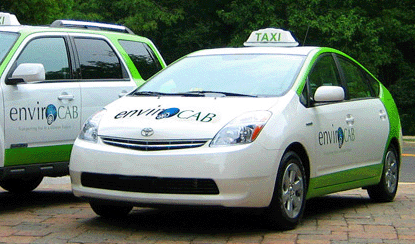Confessions of a green taxi company
 (by By Dallas Kachan) - A taxi company based solely on hybrids should be easy to set up, right? Not so, says a new company in Arlington, Virginia. Everybody wants to see green taxi cabs. So why aren’t there more of them?
(by By Dallas Kachan) - A taxi company based solely on hybrids should be easy to set up, right? Not so, says a new company in Arlington, Virginia. Everybody wants to see green taxi cabs. So why aren’t there more of them?Because the biggest hurdles to starting green taxi companies may not be technical or financial, but political.
So says the co-owner of enviroCAB, a new taxi company now open for business in Arlington, Virginia that—as of yesterday—now operates a fleet of exclusively hybrid cars and SUVs.
“Because it’s regulated, in any given market you only see a small number of players. And other companies are always against new entrants into the market,” said Hans Hess, enviroCAB partner, noting incumbent taxi companies get creative about how to try to lock newcomers like enviroCAB out.
“Politically, it’s not a straightforward process.”
Hess, 35, says he first got the idea for a taxi service using hybrid vehicles four years earlier. Working behind the scenes with officials in Arlington County, where he makes his home, gave him an education in how taxis systems operate.
Arlington doesn’t have the formal medallion system most people associate with the taxi industry, but it’s still regulated, and there are a finite number of companies with a finite number of “certificates” governing how many drivers they can employ.
Hess’ enviroCAB has certificates for up to 50 cabs, with 15 on the street today.
While New York taxi medallions routinely auction at the $400,000 level, Arlington certificates trade at $25,000-35,000, says Hess. So by structuring his company as a fleet of owner-operated cabs, he has induced owners to buy premium-priced hybrids for the promise of gasoline savings over time—by getting them to pay for the cars instead of having to buy the right-to-drive certificate.
“Because the large majority of cab companies own their own cars, there’s no incentive for them to buy hybrids and pay the higher capital expenditure because their drivers are the ones that pay for gas and would realize the savings.”
“We’ve aligned the incentive of the ownership of the vehicle with the gas savings by using an owner/operator model.”
In enviroCAB’s marketing, it promotes itself as not just carbon-neutral, but carbon-negative. The company has budgeted approximately $30,000 annually, Hess said, to spend on carbon offsets for its vehicles, as well as two additional conventional Crown Victoria-type cabs already on the streets for each one of enviroCAB’s.
“It’s a small amount of money in the grand scheme of things to operate in Arlington County. The county hadn’t authorized a new cab company in 23 years. We knew we’d have to be different.”
Hess likened the offsets to a proffer-type inducement common in the real estate industry, whereby real estate developers bolster the attractiveness of their projects to planners by adding features benefiting the public good.
In its launch, enviroCAB claimed to be the first green taxi fleet in the U.S. But that distinction could technically belong to a small group of four affiliated cab owner/operators in San Francisco called Green Cab, which began operations with a single Prius in April of last year.
And in true California style, the four do things a little differently.
“We’re legally an LLC, unique in San Francisco and probably the rest of the country in that we’re not legally a cooperative, but we operate along cooperative lines,” Green Cab owner Mark Gruberg told Cleantech.com.
Incumbent taxi companies are adding hybrids to their fleets, too—and not all willingly; San Francisco Mayor Gavin Newsom is transitioning the city’s entire taxi fleet to hybrid, alternative fuel, and green vehicles by 2010, only two years from now.
New York City, which saw its first hybrid taxis in November, 2005, is also phasing in hybrids aggressively.
Customers clearly like green cabs.
“Drivers have been telling us that when they get into a taxi line, people will avoid the other cars and try to get straight into their cab. It’s bad etiquette to take these customers, but people are really, really excited to drive with us,” said enviroCAB’s Hess.
“The public LOVES clean cabs. They love the Toyota hybrids. It’s an exhilerating experience. I get stopped in the street by pedestrians, and get supportive honks of horns from motorists,” echoed Gruberg of Green Cab.
You can return to the main Market News page, or press the Back button on your browser.

